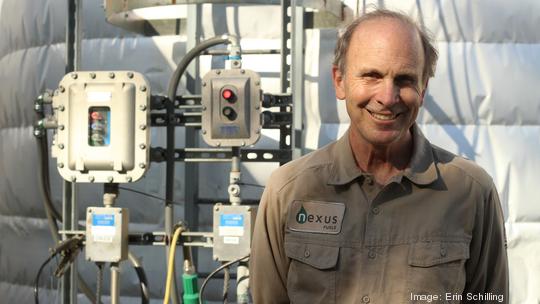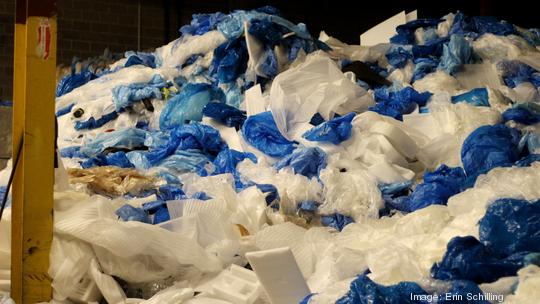
When Jeff Gold started Nexus Fuels, he measured success in oil droplets.
He was researching a way to use a thermo-chemical recycling process in order to convert certain plastics back into oil, which can then make more plastics. During lab testing, producing 16 drops of clean, usable oil felt like a success.
More than a decade into perfecting the process, the Nexus Fuels plant is now a commercial operation that has produced about 310,000 gallons of oil and diverted more than 2.7 million pounds of plastic from the landfill.
“It’s truly circular,” Gold said. “It can go around endlessly.”
Investments from Cox Enterprises’ Cleantech initiative, a branch of the private Atlanta company focused on advancing innovation in companies helping the environment, made the first commercial plant possible.
Chemical recycling allows plastics not normally supported in typical recycling streams, such as Styrofoam and film plastics, to find a new life. Critics say the process still yields a high carbon footprint and doesn’t help society curb its dependence on plastics.
But Gold says Nexus Fuels has a profitable and environmentally beneficial way to recycle plastics by turning them back into oil, potentially putting Atlanta at the forefront of the growing plastic waste management industry.
Cox Enterprises plans for cleantech
Cox Cleantech invested in Nexus Fuels in 2015 to jumpstart the recycling plant, which is located just outside of I-285 near the Fulton County Airport, and finished construction in late 2017.
In 2021, Cox invested $20 million in Nexus Fuels to add two new facilities with an updated design that will increase production. Gold said the plant can handle 50 tons of plastic per day but has not yet run it at that capacity.
Cox Cleantech has six investments so far, including in Nexus Fuels, all in companies with varying focuses, such as waste management, clean energy and sustainable agriculture.
Will Thorburn, the director of Cleantech strategy and investments, said the long-term goal for the division is to become a full subsidiary of Cox Enterprises, similar to Cox Media Group or Cox Automotive.
Cox has investment nearly $1 billion in cleantech since 2007. Thorburn said Cox may acquire the startups in its portfolio to become a part of the Cox Cleantech division.
"Cox is an important capital provider because we can think generationally,” Thorburn said.
Thorburn said Cox is looking for innovative solutions to environmental problems that are profitable and can scale without the benefits of regulatory credits. As companies get more social pressure from consumers to invest and work sustainably, Thorburn said clean tech is going to be a high-growth industry.
Cox chose Nexus Fuels because of the operational readiness of its technology, which made it stand out among competitors in the plastic chemical recycling field.
'Recycling molecules’
Gold has spent his entire career with the goal of helping the environment. He said even as a child, he wondered what happened to plastics when they left the trash can.
The chemical recycling process has been around for decades as a potential solution for plastic waste, but the systems were usually costly and caused other environmental harms. For years, Gold read patent information and academic literature on the subject, testing and retesting the system that eventually became the backbone of the Nexus Fuels plant.
Nexus Fuels takes plastic waste from industrial and commercial suppliers and uses a thermo-chemical process to transform them back into oil, which can then be turned back into plastics that have the same properties as those made from virgin oil. The company deals with hard-to-recycle plastics such as plastic bags, Styrofoam and rigid plastics. It does not support recycling for water bottle plastic, which mechanical recycling facilities can handle through a different process.

"We’re recycling molecules,” Gold said. “We’re not recycling plastic. That makes a huge difference in the life of the product and how it’s handled.”
A McKinsey & Co. study suggests that 50% of plastics worldwide could be reused or recycled by 2030, creating a plastic waste management industry that could have $55 billion in global profits. Chemical recycling may become an important component of that growth.
The Nexus Fuels plant is a closed-loop system. The residue created through the process is a carbon-rich material that the plant can sell to companies to turn into asphalt. Gases produced through the process are captured and reused to heat the reactor. Emissions produced by the Nexus Fuels plant are well below the Georgia and Environmental Protection Agency limits, according to its website.
Some environmentalists say chemical recycling causes more harm than good because of inefficient technology and waste that occurs during the process. They say efforts toward sustainability should focus on reducing plastic manufacturing overall because chemical recycling can't manage the world’s growing plastic waste.
“Our carbon footprint is very low compared to a lot of alternative technologies, and our ability to do this at a commercial scale right now puts us at the forefront globally,” Gold said. He added that plastics are less environmentally harmful to make and transport than other materials, and recycling plastics in this way keeps them out of the landfill.
A leader in the industry
Companies interested in Nexus Fuels oil are often surprised by the quality and efficiency of the product, Gold said.
Oil companies Royal Dutch Shell and Chevron Phillips Chemical buy the oil that Nexus Fuels produces and turn it into new plastics. Gold said the startup produces about one to two tanker truck of oil each week and is talking with companies around the world for expansion plans.
Thomas Casparie, executive vice president of Shell’s global chemicals business, called the agreement with Nexus a "positive step towards providing our customers with bigger volumes of sustainable, circular chemicals.”
The Nexus Fuels process has a higher energy-returned-over-energy-invested score than its competitors, according to a study published on the Nexus website. The study says the Nexus process is behind only hydro and coal production in terms of energy efficiency and effectiveness.
Gold also works with manufacturers to suggest changes to their products that would make them easier to recycle. For example, plastic chip bags have an aluminum lining that make them unable to go through this process.
Nexus Fuels also continues to experiment and test different waste plastics can be put through its system in a lab onsite. As the startup grows, Gold said he hopes they can start taking plastic waste from consumers but that there needs to be better education for how and what to recycle.
“It’s a long-term thing we have to work on,” Gold said. “People have to understand why it’s important to them.”






